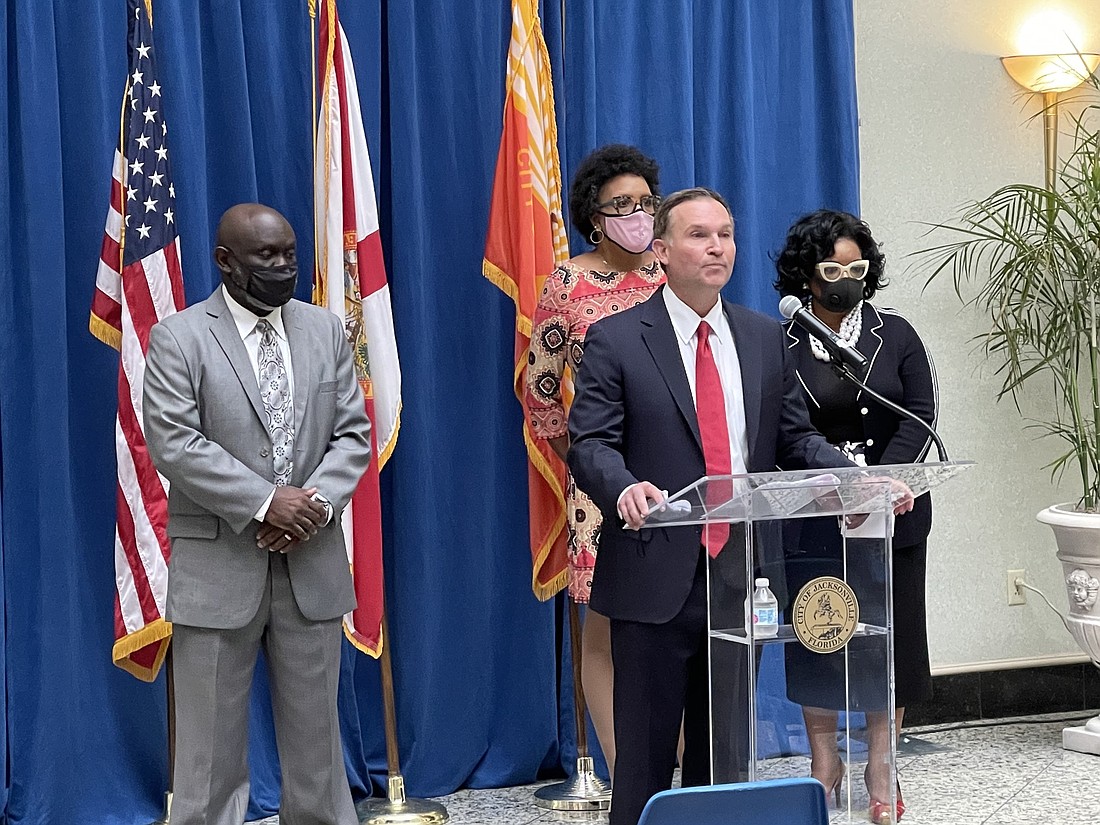
Mayor Lenny Curry said Feb. 11 his administration is in early discussions to find long-term funding for septic tank removal and sanitary sewer service access for more than 30 Duval County neighborhoods, an estimated $2 billion project.
“For so long, government has looked the project and said ‘it’s a $2 billion project. It’s too big’ and just ignored it and moved on. But we have to start somewhere,” Curry said. “We can’t just keep writing this off as a multigenerational, multibillion problem that’s too big to address.”
At a Feb. 11 City Hall news conference, Curry announced $26.8 million in additional city and JEA money for a 2016 septic tank phaseout program that is $31.8 million short of the $86 million needed. He was joined by Council Vice President Sam Newby and Council members Brenda Priestly Jackson and Ju’Coby Pittman,
City-owned utility JEA has $54.2 million in dedicated septic tank phaseout funding.
The project is being done in phases in the Biltmore, Beverly Hills and Christobel neighborhoods in Northwest Jacksonville.
Even with the additional money, the city would still be short, but Curry will lobby the Legislature for the remainder of the funding.
Curry Chief of Staff Jordan Elsbury said the city’s commitment makes the project eligible for state water quality project funding.
If the city fails to win the state money, Curry said the project still will be completed.
“We will absolutely finish these projects,” he said. “If we have to bridge a gap, we will bridge a gap to finish these neighborhoods.”
Of the $26.8 million, $14.3 million will come from the city and $12.5 million from JEA.
Elsbury said the city’s contribution will treated as a capital project and funded by a combination of debt and cash on hand.
JEA CEO Jay Stowe said Jan. 28 he has asked his leadership team to meet with the city Department of Public Works to find a long-term strategy for septic tank removal.
Curry blamed the missed budget target in the 2016 project on changing market and economic conditions.
“When you think about the magnitude of billions of dollars in septic tank work that’s going to need to be done, we know the cost structures are going to change. They could go up and they could go down,” Curry said. “But the longer we wait the more volatile it is, which is why we’re going to collaborate to come up with a long-term solution.”
The mayor didn’t offer a timeline or dollar amount for the countywide septic tank remediation, but said he expects an initial investment of “hundreds of millions of dollars … with a pathway to the billions of dollars it would cost over time.”
Curry said he will meet with the 19 Council members and start engaging Jacksonville civic groups to stress the effect aging septic tanks have on the city’s water quality and quality of life for residents.
The city estimated in 2016 that 65,000 septic tanks needed to be replaced in Jacksonville, many of which predate consolidation in 1968.
Curry’s proposal comes two days after Council President Tommy Hazouri filed legislation to borrow and allocate $100 million for septic tank removal and install sewer service to underserved communities.
Hazouri’s bill, Ordinance 2021-0100, would use fixed-rate debt and the city’s commercial paper program — short-term liquidity loan option — to finance the septic tank phaseout.
The mayor said Feb. 11 he had not seen Hazouri’s proposal but wants to use debt spending for septic tanks “in a smart way.”
Priestly Jackson, who chairs the Council Social Justice and Community Investment Special Committee, said she expects legislation will be filed to reprioritize the list of 35 areas targeted for septic tank removal based on where officials see the greatest need.
She said she was not aware of Hazouri’s bill until it was announced Feb. 9, but she said sanitary sewer access is a topic where all Jacksonville elected officials can find agreement.